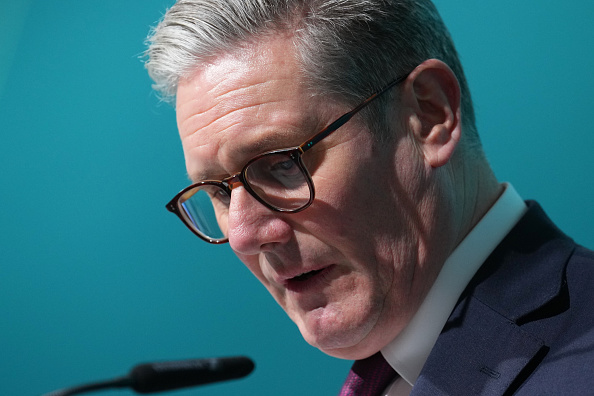Given that his party promised during the election to make Britain a “clean energy superpower” with a carbon-neutral electricity system by 2030, Keir Starmer’s presence in Baku this week was far from surprising. He travelled for the annual UN climate conference, COP 29, although the leaders of the European Union, China, India, Germany, France and the USA are not expected to attend.
According to his spokesman, the Prime Minister went because “it’s important the UK returns to a position of global climate leadership”, and he wanted to “send a clear signal” that Britain is committed to “ambitious” emissions targets. This he duly did this morning, unveiling a pledge that as well as meeting the Net Zero electricity target, Britain would continue to cut emissions in other fields such as heating and transport. The goal of this plan is that by 2035 the country’s emissions will be down 81% from 1990.
What’s not so clear, however, is whether other large countries whose heads of government will be absent will actually follow the path that Starmer and Energy Secretary Ed Miliband intend to pioneer.
The election of Donald Trump in the US has already provoked loud lamentation from environmentalists. Following years of similar statements, in September Trump described climate change as “one of the great scams”. What’s more, he has vowed to withdraw America from the 2015 agreement made at COP 21 in Paris, which was supposed to bind the world in keeping the rise in average temperatures to 1.5°C above pre-industrial times.
Starmer notwithstanding, it therefore seems certain that COP 29 will not achieve what many green advocates regard as its principal objective: a pledge by advanced nations to increase “climate aid” to the developing world from $100 billion to $1 trillion or more a year.
Trump’s return is not the only flaw in the never-ending COP process. Nine years after COP 21, it’s worth examining what some of the world’s biggest emitters have done with their own energy systems since the “historic” Paris agreement, bearing in mind that Britain accounts for just 1% of global greenhouse emissions.
Since 2006, China, the world’s second-largest economy, has been emitting more carbon dioxide than any other nation — almost a third of the planetary total. In 2020, President Xi Jinping promised that Chinese emissions would peak by 2030, and reach Net Zero by 2060.
However, Beijing has been approving and constructing new electricity power plants that burn coal — the world’s dirtiest fuel — with abandon. Since the beginning of 2022, China has granted permission for new coal power plants with a total capacity of 218 gigawatts (GW) — more than five times the UK’s average total demand for electricity. Britain now has no coal-fired power stations at all, and while China’s emissions continue to increase, the UK’s have fallen by 46% since 1990. By the end of 2023, almost half of the newly-approved Chinese coal plants were already being built.
India’s promises have been just as empty. In 2022, its government submitted a document to the UN setting out its policy to promote a “healthy and sustainable way of living based on traditions and values of conservation and moderation”. Whatever that may have meant, India has also been building and commissioning new coal-fired power stations with enthusiasm. It currently has new plants in its pipeline with a combined capacity of 46GW, about as much as the UK’s peak total demand on a freezing winter’s day, and has said it will not eliminate but double its coal production by 2030.
The list of countries which have added to their coal-fired power supply since Paris is long. It also includes Indonesia, Vietnam, Japan, South Korea, Malaysia, Thailand, Senegal and Kazakhstan.
There is, of course, a reason why China and other countries like coal-fuelled electricity: it is relatively cheap. That means they can use it to make and sell products such as solar panels to their more environmentally-aware customers, such as Britain. China controls more than 80% of the global solar-panel market, whereas Britain’s last solar factory closed in 2013 — thanks to Chinese competition.
Then again, Britain already has the highest electricity prices in the developed world, with the cost to industrial users rising 124% in the last five years to reach a level 50% higher than in France and Germany — and four times as much as the US. In China, one kilowatt hour of electricity will cost a business just 7p, but in Britain the going rate is three and a half times higher at 25p. This before any of the new government’s green measures begin to take effect.
Starmer is not the first British prime minister to go to a COP promising “climate leadership”, nor the first to promise that cutting emissions and relying on renewables would lead to energy security, prosperity and jobs. He may learn the hard way that if other, much bigger emitters fail to follow his lead, the political cost may be incalculable. The benefit to the planet, though, would be almost negligible.
Tickets are on sale to Exposing Net Zero Myths on Wednesday 27 November at the UnHerd Club.











Join the discussion
Join like minded readers that support our journalism by becoming a paid subscriber
To join the discussion in the comments, become a paid subscriber.
Join like minded readers that support our journalism, read unlimited articles and enjoy other subscriber-only benefits.
Subscribe